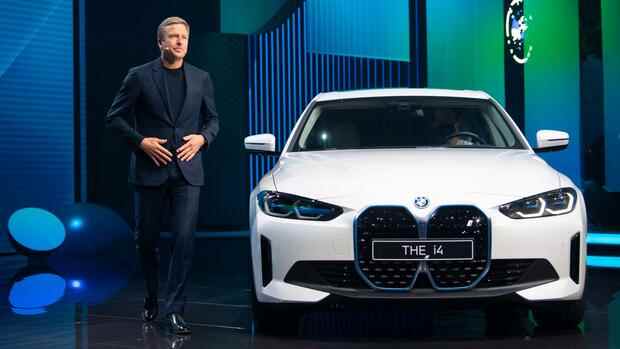New electric models such as the i4 should also ensure growth in 2022.
(Photo: dpa)
Munich The BMW Group is again number one in premium cars. The Munich-based company is reporting sales of 2.21 million cars for the BMW brand for the year 2021. With this record sales, BMW is also a good 100,000 units ahead of its arch-rival Mercedes. For the current year, Sales Director Pieter Nota was confident. “We want to continue to grow profitably in 2022.”
BMW benefited in particular from high demand in the USA, where sales soared by almost a fifth. In China, the Munich-based company sold 8.9 percent more cars. With a total of 846,237 cars sold, the People’s Republic is the largest single market. In Europe there was an increase of 3.9 percent. In Germany, however, sales fell by 6.8 percent.
At group level, too, BMW, with its Mini and Rolls-Royce sub-brands, is well ahead of Mercedes and Smart. Even including the Mercedes Van division, the BMW Group is now larger than Mercedes with 2.5 million cars sold. Audi – in the meantime the worldwide number one in 2013 – is now lagging behind with 1.68 million units.
The demand for premium and luxury cars is high worldwide – but unlike its rivals, BMW is more capable of delivering than its competitors. The reason: The BMW plants are better supplied with semiconductors. Unlike their rivals, the Munich-based company stocked up on computer chips earlier and more extensively. The result: At Mercedes and Audi, the production lines stand still more often than at BMW.
Top jobs of the day
Find the best jobs now and
be notified by email.
In the fourth quarter in particular, the industry ran out of chips: BMW delivered 14 percent fewer cars, Mercedes-Benz fell by a quarter, and Audi even slumped 34 percent. “The ongoing shortage of semiconductors had an impact in the second half of the year,” says Audi. “Mercedes-Benz is making every effort to ensure that new vehicles can be delivered to customers as soon as possible after they have been ordered,” emphasizes the Stuttgart office.
“The situation with semiconductors remains volatile, however, and it can be assumed that it will continue to influence production and sales in the coming quarters.” At Audi, too, it is assumed that the semiconductor crisis will drag on well into the current year. Only Tesla has no problems with the chip shortage: The Americans sold almost 940,000 cars last year and want to double their sales in 2022.
Profitable in the chip crisis
All German premium manufacturers should deliver good profits. Because of the delivery problems, Mercedes, BMW and Audi are practically no longer giving discounts. In addition, all three brands have geared their range of models to a much greater extent towards luxury models, so profits increase even with falling or stagnating sales. The corporations will only present the results in the coming months.
BMW promises more sales and more profit. “We want to continue to grow profitably in 2022,” says Sales Director Pieter Nota. The aim is to double sales of all-electric cars from 100,000 to 200,000. With the i4 and the iX, BMW has two new electric cars on the market, and an electric 7-series BMW is to be presented in 2022.
The prestige success generates satisfaction in Munich. Although a new rival has emerged with Tesla, the duel with Mercedes remains a decisive benchmark for Munich. The last time BMW landed before Mercedes was in 2016. Ex-BMW boss Harald Krüger had promised to catch up again quickly, but he was no longer trusted. His successor Oliver Zipse can now book this success on his account.
More: The chip crisis is making new cars a scarce commodity – but the car companies are making a lot of money
